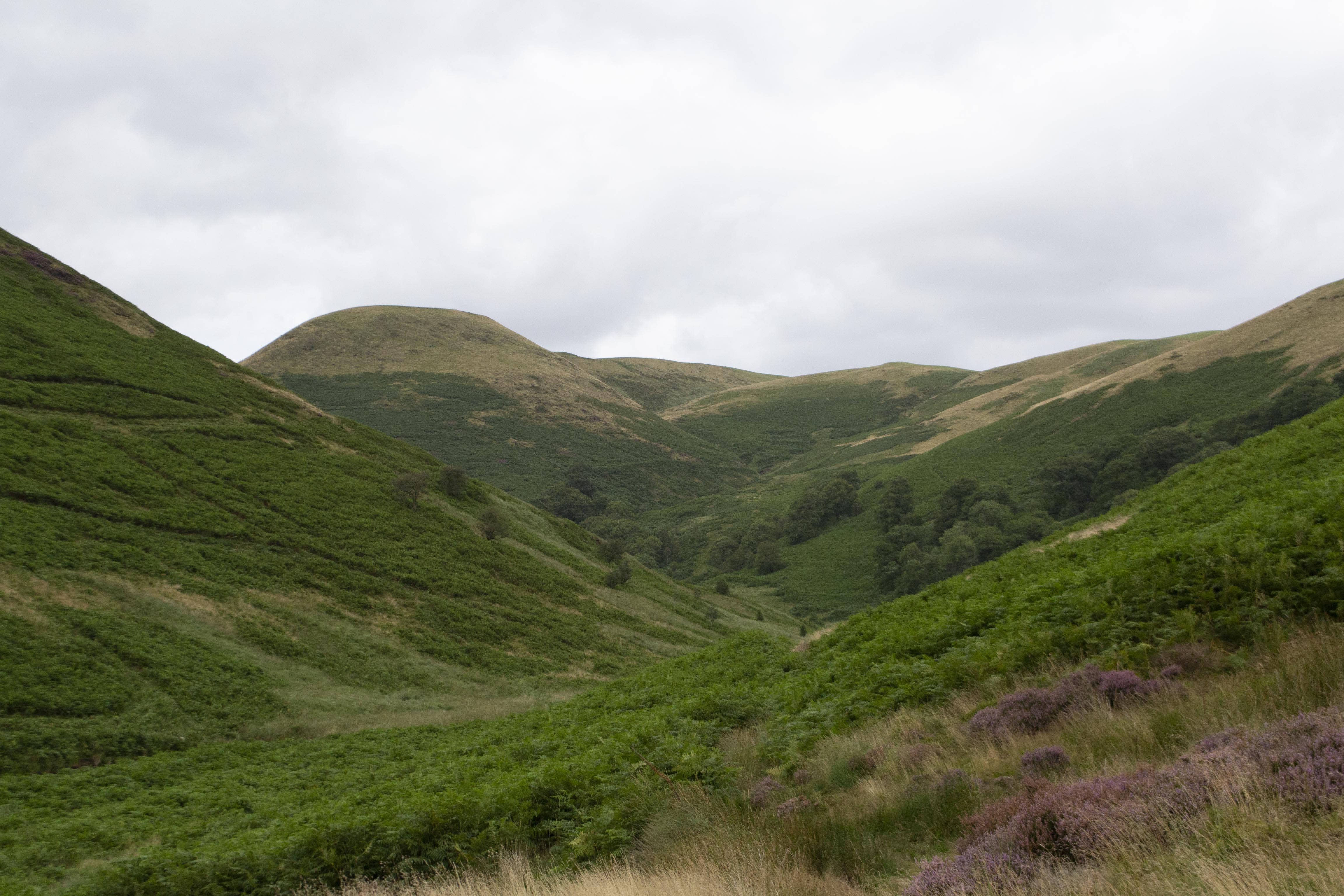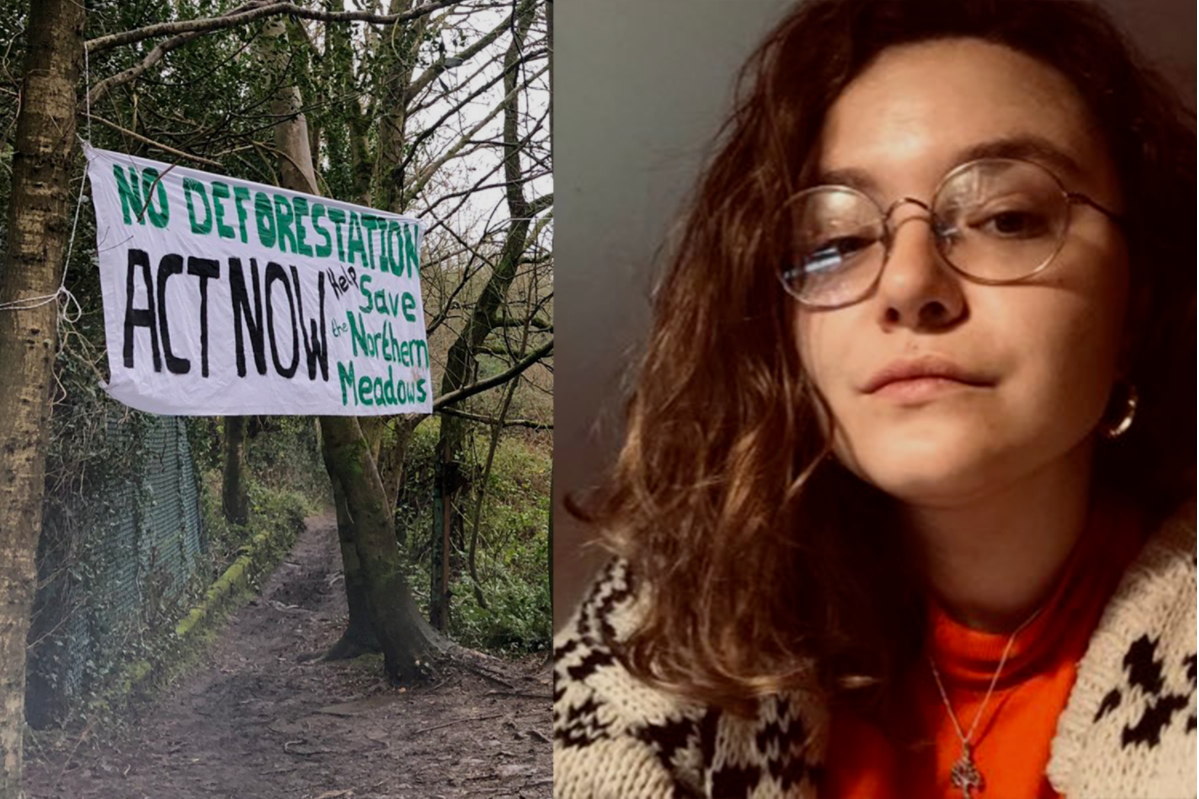
The Great Green Gold Rush: Fossil Fuel Companies, Welsh Land & Greenwashing Big Oil
A tree planting scheme in Wales is turning a profit for companies looking to carry on emitting carbon into the atmosphere. Carys Hopkins delves into the issue.
Image: Rural Carmarthenshire, where farms have been bought up by large investment firms. Photo: SC Cook
The Welsh government is making plans for carbon reduction that might not actually reduce the overall amount of carbon emissions being released into the atmosphere.
Instead, they have come up with schemes that many will say looks and feels a lot like greenwashing.
In July 2021, Lee Waters, the deputy Minister of climate change released a statement on a new government plan to tackle climate change by planting trees.
The plan was for 43,000 hectares of land in Wales by 2030 and 180,000 hectares by 2050 to have trees planted on.
This is something we are seeing across the globe, as politicians and governments are pressured into creating carbon reduction plans.
Tree planting schemes are seen as a safe option as they are unlikely to upset big business, are relatively popular and there is some serious money to be made from it.
The Welsh Government is spending £17 million on this scheme alone, which is an attractive prospect for big firms looking to get some of this money.
Planting trees has been a favourite of ‘philanthropic’ millionaires and billionaires in recent years. It is relatively cheap and seen as a good deed. Tech bosses such as Elon Musk, Bill Gates and Jeff Bezos, have thus made the most of tree planting — and been accused of greenwashing in the process.
The Welsh Government scheme allows companies — and pays them— to plant trees and restore forests. This is leading to the buying up of large tracts of Welsh land by huge private firms.
Planting trees is of course to be welcomed and is completely necessary to absorb carbon from the atmosphere. Equally, converting areas of so-called green desert in Wales into thriving woodland habitat is what environmentalists such as George Monbiot have long been calling for.
But there are several reasons to be sceptical about these schemes. In fact they may be little more than a chance for the rich to cash in on the climate crisis whilst doing little to stop it.
First off there is the issue of carbon offsetting itself. This is when firms plant carbon-absorbing trees, often in the absence of reducing their own carbon emissions, something that is inherently counterproductive because it does not reduce the overall amount of carbon and can in fact encourage carbon emissions in the present.
Equally, because climate change is currently affecting tree species globally, a company’s carbon emissions will have an impact on trees somewhere in the globe. Why plant trees in one area to endanger other trees elsewhere?
But carbon reduction isn’t the primary goal of the firms hoovering up swathes of rural Wales – profit is, and in this they are helped by legislation.
The Environment (Wales) Act 2016 which states that “The objective is to maintain and enhance the resilience of ecosystems and the benefits they provide”.
“Benefits” can and is being interpreted as what nature does for big business. In other words, How can ecosystems make a company a profit?
The answer is through a number of ways, whether through producing goods, planting trees or to greenwash their brand.
But when a company is primarily motivated to enhance and protect their capital, how can this possibly best serve the interests of nature?
Let’s look at one of the biggest players in the new Welsh green gold rush, Foresight.
Foresight Group is a private equity management company with a profile of £8.1 billion. In Foresight’s sustainability report they state the importance of trees, and say they “have invested in over 6,000 hectares of forestry”. The company then created Foresight Sustainable Forestry Company PLC (FSF), in late August 2021.
Shares in FSF are now live on the London Stock Exchange. Their main page boasts that they are “Offering direct and liquid access to the attractive investment characteristics of UK forestry and afforestation projects”.
One of the key risks that FSF feels it will face is the “Availability of appropriate forestry investments and attractive investment terms for investments”. Another risk they have highlighted is “product price fluctuations”.
It is evident from their language that the company sees forestry on profitable terms. In this Foresight advert, they are clear that the bulk of their forestry will likely be a monoculture of trees, such as pine and spruce, to provide materials for the construction industry.
And as Mark Redfern found out in a previous article, Foresight plans to fell trees for a profit at the earliest opportunity.
Perhaps this approach is why Blackrock is an investor in Foresight. Blackrock is an American investment management company — similar to Foresight’s business model, and is a private equity management company. Larry Fink, the CEO of Blackrock, oversees the firm’s $85bn in fossil fuel investments. Larry Fink and Blackrock have repeatedly spread disinformation and damaging propaganda through their business to discredit the impact of manmade climate change.
That Blacrock is investing in both the emission of fossil fuels and the apparent (but highly dubious) offsetting of them through Welsh afforestation can be seen as a neat parable about capitalism’s approach to the climate breakdown: profit from the crisis in every way possible, whilst doing nothing to stop it.
But Foresight and Blackrock are not the only ones developing this dual approach and selling it as green. What’s interesting about the scheme in Wales, and elsewhere, is the government is subsidising it.
In 2019 Shell partnered with Forestry and Land Scotland to plant about 1 million trees over the course of five years. They even dedicated one of their podcast episodes on it, aptly titled “Trees: one way to tackle climate change?”. Yes, Shell – one of the companies most responsible for climate change – has a podcast on all things climate related.
In this episode they discuss whether trees really do help tackle climate change, and Shell’s responsibility within the tree planting realm. In summary, they conclude it is “philanthropically” great work that Shell is doing, and a “wonderful set of schemes”.
But all this really masks what we know to be true if we have any chance of halting climate change now: Stop burning fossil fuels.
This, however, is not an option for big oil, as it would result in extreme losses, which they just will not stand for.
Unfortunately, Welsh Government policy actively facilitates this distortion.
In a new Net Zero report, the Welsh Government details their new approach to tackling climate change, but more specifically how they will tackle carbon emissions.
The “Policy 62 – Glastir” aims to “reduce the impacts of climate change within agriculture and reverse biodiversity loss, whilst improving water, air and soil quality”.
Land Use Land Use Change & Forestry (LULUCF) is where the new approach to their tree planting scheme lies. So they state that “We want to plant 43,000 hectares of new woodland by 2030 in this decade of action and 180,000 hectares by 2050”.
The report also mentions their support of the Woodland Carbon Code. This is a government supported scheme that “issues carbon units which represent measurable amounts of carbon dioxide (CO2) removed from the atmosphere by trees as they grow”.
A landowner, company or project developer can therefore buy and sell these units.
The units can be used to “offset, balance or compensate” a company’s current emissions.
There is no explicit detail as to whether this reduction in emissions will be counted toward Wales’ overall reduction, but inferring from the report, it seems they will be. But it begs the alarming question, are the emissions being counted twice? Once for the government and once for the company?
I tried to ask this question to both the Minister for Climate Change minister Julie James and the deputy Lee Walters, but could not get hold of either.
Planting trees in an effort to tackle climate change is not enough on its own, and can even be more damaging when it is done only so that fossil fuels can be burnt in the here and now.
A focus on solely carbon emissions is also limited, as methane and nitrogen emissions need to be addressed and tackled as well.
Carbon capture and removal is a lengthy debate, when it is done sincerely by those who want to help tackle climate change, it can be done really well.
But when private companies come in and use government schemes to greenwash their brand and do the bare minimum, in regards to reducing their impact on climate change, it becomes extremely problematic.
At the same time, the nature of these schemes – threatening to plant a monoculture of fir trees by faceless mega corporations – risks alienating whole communities and generating scepticism about the very idea of tackling climate change.
Fighting climate breakdown and changing land use could be a genuine community activity, publicly run and with real accountability. Instead it has been turned into the opposite,
The question is if the Welsh Government will continue to facilitate this or will they seek a different approach? From the evidence we have, it seems that it is companies like Foresight who stand to benefit the most.


